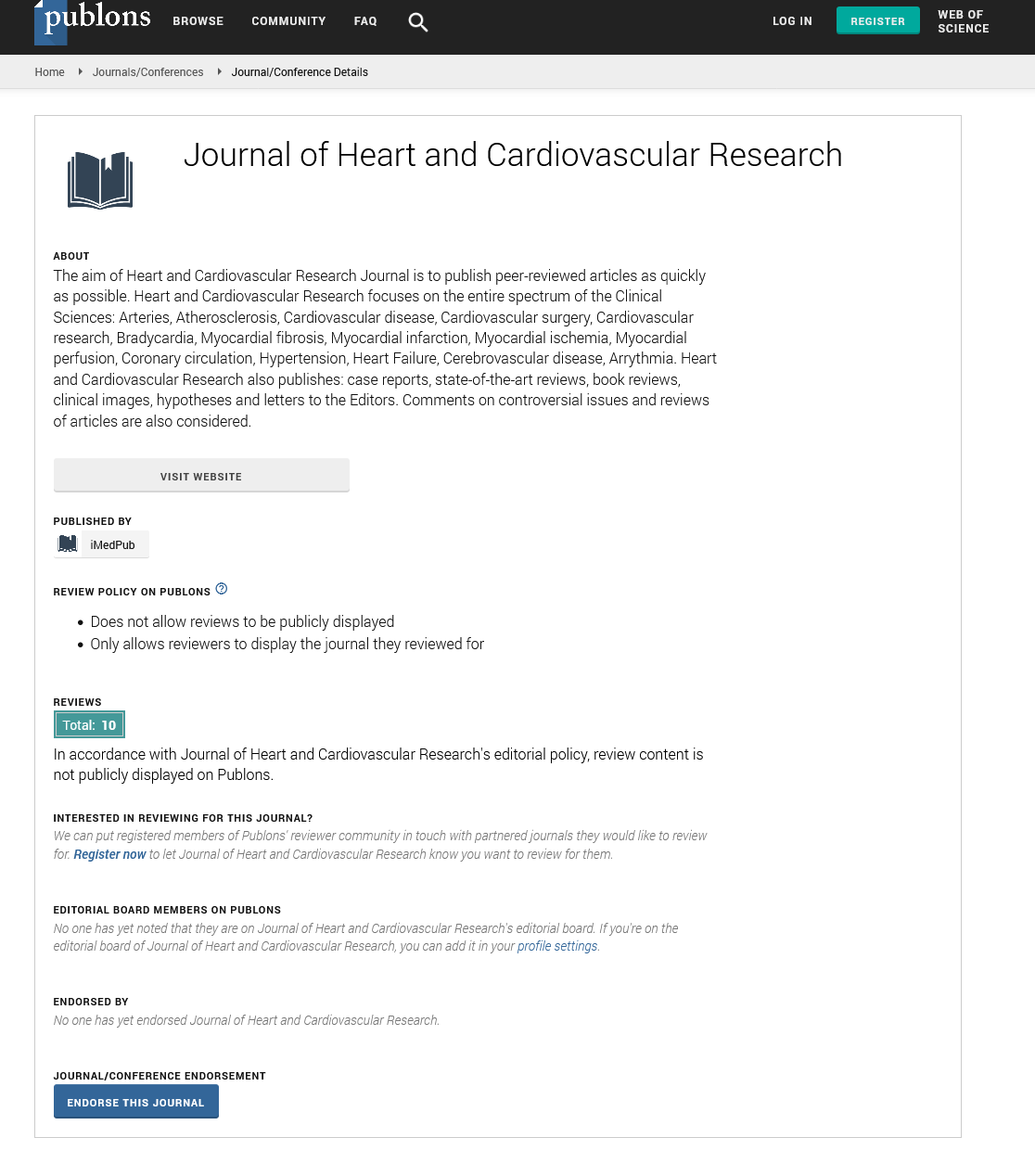ISSN : ISSN: 2576-1455
Journal of Heart and Cardiovascular Research
Novel technique to prevent no/slow flow during PCI by sodium nitroprusside injection time, point and method
22nd International Conference on New Horizons in Cardiology & Cardiologists Education
March 07-08, 2019 Berlin, Germany
Sarbesh Kumar Jha
Koshi Zonal Hospital, Nepal
ScientificTracks Abstracts: J Heart Cardiovasc Res
DOI: 10.21767/2576-1455-C1-002
Abstract
Introduction: The no-reflow incidence appears to be highest in acute myocardial infarction patients who undergoes primary percutaneous coronary intervention (PCI) or during PCI of saphenous vein grafts. The intracoronary administration of medications that causes vasodilatation in small distal coronary vasculature forms the base of management of no-reflow. Sodium nitroprusside (NTP) does not require intracellular metabolism to induce vasodilatation in microcirculation. In view of above present study was undertaken to evaluate efficacy and usefulness of sodium nitroprusside in prevention of no/ slow reflow at the time of fixing stents and balloons simultaneously and complications associated with it.
Material & Methods: The current study comprised of 93 patients who were done percutaneous coronary interventions and were randomly divided into two groups namely: Drug (Nitroprusside) given group (n=47) and placebo group (n=46). A stent or a balloon on specific lesion was passed and then loading dose of sodium nitroprusside (50-100 micro gram) or normal saline (2-3 ml) was prepared and injected through guiding catheter into coronary artery. Maximum Duration of decreased BP and TIMI Grade were noted. A Pearson correlation analysis was conducted to examine whether there is a relationship between Nitroprusside and Coronary Slow/ No Reflow. A statistical analysis of numerical variables expressed as mean±SD was done using ANOVA.
Results: Five cases of coronary slow/no reflow in placebo group and no cases in nitroprusside group were reported. A significant and negative relationship between 2 parameters (r=.24, N=93, p=.02). The Lowest SBP was 56 mmHg (Mean=101.34, SD=20.663), maximum SBP difference with in 2-3 minute each time drug was given was 100 mmHg (Mean=29.38, SD=18.431) and maximum duration of falling blood pressure was 180 seconds (Mean=91.21, SD=24.655).
Conclusion: Intracoronary nitroprusside is useful for the prevention of the slow reflow or no-reflow phenomenon following PCI in acute myocardial infarction. This knowledge can be utilized to prevent the coronary vasospasm during PCI which would be beneficial to reduce complications during and after PCI. After this trial since 2013-2017 we used same procedure for more than 4000 patients and only two patients were reported slow flow.
Recent Publications
1. Novel Technique to Prevent No/Slow Flow during PCI by Sodium Nitroprusside Injection Time, Point and Method.
2. Artificial Cervical Disc Replacement; “Double edge Sword” a clinical review.
3. Morphine consumption in a Tertiary Care Hospital in Eastern Nepal
4. Pattern and Outcome of Acute Poisoning Cases in a Tertiary Care Hospital in Eastern Nepal.
5. Comparison of health education, oral Rehydration solution, Metoprolol and midodrine intervention in children with POTS.
Biography
Sarbesh Kumar Jha, MD and PhD, recently done research in intervention cardiologist to prevent disaster of slow flow during PCI, and another research how to approach CTO and which CTO clinically significant to open. Dr. Jha has his/expertise in intervention cardiologist. He has build model medical teaching method in china in 1997 which (English medium) after years of experience in research, evaluation, teaching and administration in organization. He had variety of experience in different role of job during his young carrier eg; worked as researcher, emergency coordinator during disaster, humanitarian expert, work in conflict situation, field based clinical research to operational based research.
E-mail: Jiaha2009@live.com
Google Scholar citation report
Citations : 34
Journal of Heart and Cardiovascular Research received 34 citations as per Google Scholar report
Journal of Heart and Cardiovascular Research peer review process verified at publons
Abstracted/Indexed in
- Google Scholar
- Sherpa Romeo
- China National Knowledge Infrastructure (CNKI)
- Publons
Open Access Journals
- Aquaculture & Veterinary Science
- Chemistry & Chemical Sciences
- Clinical Sciences
- Engineering
- General Science
- Genetics & Molecular Biology
- Health Care & Nursing
- Immunology & Microbiology
- Materials Science
- Mathematics & Physics
- Medical Sciences
- Neurology & Psychiatry
- Oncology & Cancer Science
- Pharmaceutical Sciences
